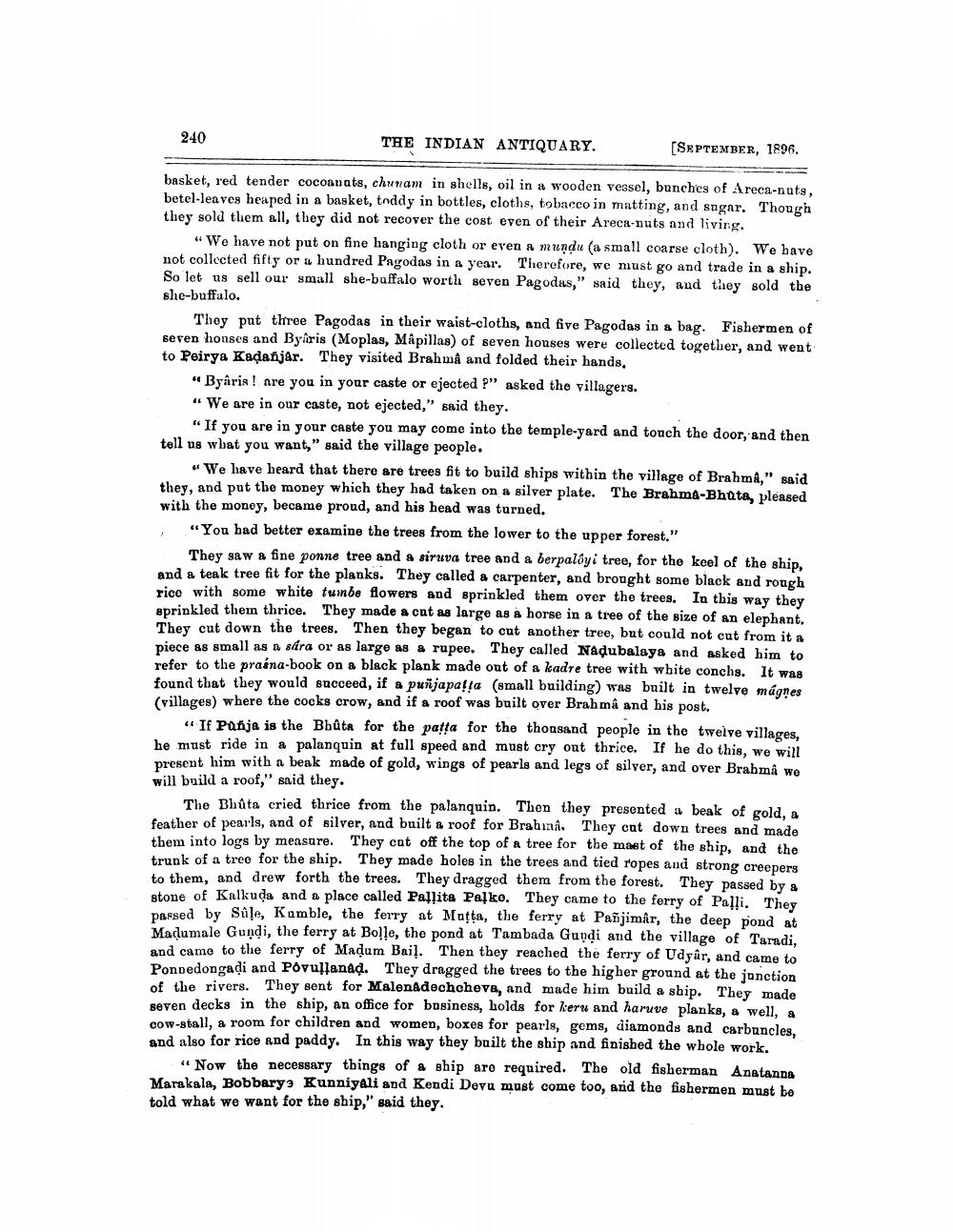________________
240
THE INDIAN ANTIQUARY.
[SEPTEMBER, 1896.
basket, red tender cocoanats, chunam in shells, oil in a wooden vessel, bunches of Areca-nuts, betel-leaves heaped in a basket, toddy in bottles, cloths, tobacco in matting, and sugar. Though they sold them all, they did not recover the cost even of their Areca-nuts and living.
"We have not put on fine hanging cloth or even a mundu (a small coarse cloth). We have not collected fifty or a hundred Pagodas in a year. Therefore, we must go and trade in a ship. So let us sell our small she-buffalo worth seven Pagodas," said they, and they sold the she-buffalo.
They put three Pagodas in their waist-cloths, and five Pagodas in a bag. Fishermen of seren honses and Byaris (Moplas, Måpillas) of seven houses were collected together, and went to Peirya Kadanjar. They visited Brahmâ and folded their hands,
"Byâris ! nre you in your caste or ejected ?" asked the villagers. “We are in our caste, not ejected," said they.
"If you are in your caste you may come into the temple-yard and tonch the door, and then tell us what you want," said the village people.
"We have heard that there are trees fit to build ships within the village of Brahma," said they, and put the money which they had taken on a silver plate. The Brahma-Bhata, pleased with the money, became proud, and his head was turned. ; "You had better examine the trees from the lower to the upper forest."
They saw a fine ponne tree and a siruva tree and a berpalôyi tree, for the keel of the ship, and a teak tree fit for the planks. They called a carpenter, and brought some black and rough rice with some white tumbe flowers and sprinkled them over the trees. In this way they sprinkled them thrice. They made a cat as large as a horse in a tree of the size of an elephant. They cut down the trees. Then they began to cut another tree, but could not cut from it a piece as small as a sdra or as large as a rupee. They called Nadubalaya and asked him to refer to the prasna-book on a black plank made out of a kadre tree with white conchs. It was found that they would succeed, if a puñjapata (small building) was built in twelve mágnes (villages) where the cocks crow, and if a roof was built over Brahma and his post.
"If Panja is the Bbūta for the patta for the thousand people in the twelve villages. he must ride in a palanquin at full speed and must cry out thrice. If he do this, we will present him with a beak made of gold, wings of pearls and legs of silver, and over Brahma we will build a roof," said they.
The Bhúta cried thrice from the palanquin. Then they presented a beak of gold, a feather of pearls, and of silver, and built a roof for Brahın. They cut down trees and made them into logs by measure. They cut off the top of a tree for the most of the ship, and the trunk of a tree for the ship. They made holes in the trees and tied ropes and strong creepers to them, and drew forth the trees. They dragged them from the forest. They passed by a stone of Kalkuda and a place called Pallita Palko. They came to the ferry of Palli. They passed by Sûle, Kamble, the ferry at Matta, the ferry at Pañjimâr, the deep pond at Madumale Gundi, the ferry at Bolle, the pond at Tambada Gundi and the village of Taradi, and came to the ferry of Madum Baiļ. Then they reached the ferry of Udyûr, and came to Ponpedongadi and Povullanad. They dragged the trees to the higher ground at the junction of the rivers. They sent for Malenddechcheva, and made him build a ship. They made seven decks in the ship, an office for business, holds for keru and haruve planks, a well, a COW-stall, a room for children and women, boxes for pearls, gems, diamonds and carbuncles, and also for rice and paddy. In this way they built the ship and finished the whole work.
"Now the necessary things of a ship are required. The old fisherman Anatanna Marakala, Bobbarys Kunniyali and Kendi Devu must come too, and the fishermen must be told what we want for the ship," said they.




